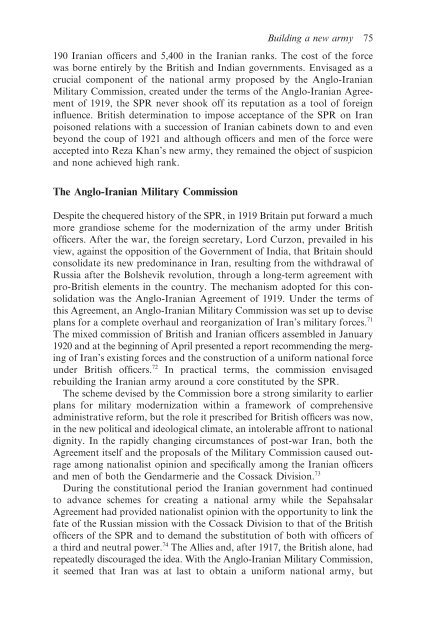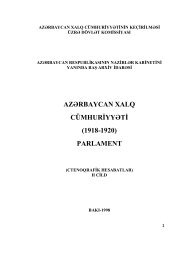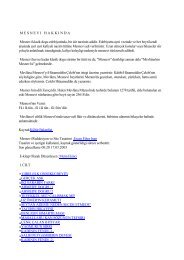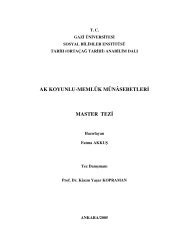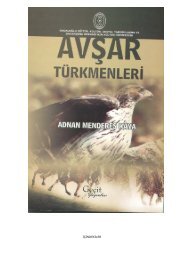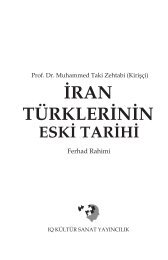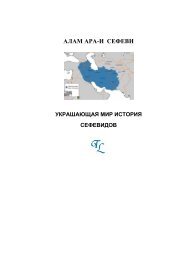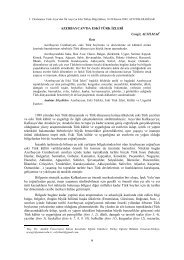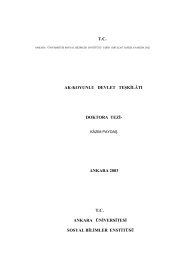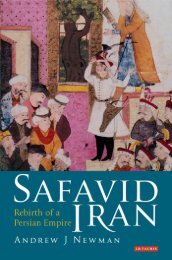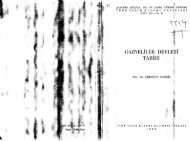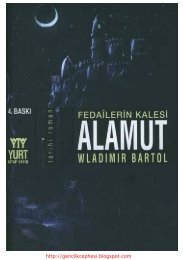War and Peace in Qajar Persia: Implications Past and ... - Oguzlar.az
War and Peace in Qajar Persia: Implications Past and ... - Oguzlar.az
War and Peace in Qajar Persia: Implications Past and ... - Oguzlar.az
- No tags were found...
Create successful ePaper yourself
Turn your PDF publications into a flip-book with our unique Google optimized e-Paper software.
Build<strong>in</strong>g a new army 75190 Iranian officers <strong>and</strong> 5,400 <strong>in</strong> the Iranian ranks. The cost of the forcewas borne entirely by the British <strong>and</strong> Indian governments. Envisaged as acrucial component of the national army proposed by the Anglo-IranianMilitary Commission, created under the terms of the Anglo-Iranian Agreementof 1919, the SPR never shook off its reputation as a tool of foreign<strong>in</strong>fluence. British determ<strong>in</strong>ation to impose acceptance of the SPR on Iranpoisoned relations with a succession of Iranian cab<strong>in</strong>ets down to <strong>and</strong> evenbeyond the coup of 1921 <strong>and</strong> although officers <strong>and</strong> men of the force wereaccepted <strong>in</strong>to Reza Khan’s new army, they rema<strong>in</strong>ed the object of suspicion<strong>and</strong> none achieved high rank.The Anglo-Iranian Military CommissionDespite the chequered history of the SPR, <strong>in</strong> 1919 Brita<strong>in</strong> put forward a muchmore gr<strong>and</strong>iose scheme for the modernization of the army under Britishofficers. After the war, the foreign secretary, Lord Curzon, prevailed <strong>in</strong> hisview, aga<strong>in</strong>st the opposition of the Government of India, that Brita<strong>in</strong> shouldconsolidate its new predom<strong>in</strong>ance <strong>in</strong> Iran, result<strong>in</strong>g from the withdrawal ofRussia after the Bolshevik revolution, through a long-term agreement withpro-British elements <strong>in</strong> the country. The mechanism adopted for this consolidationwas the Anglo-Iranian Agreement of 1919. Under the terms ofthis Agreement, an Anglo-Iranian Military Commission was set up to deviseplans for a complete overhaul <strong>and</strong> reorganization of Iran’s military forces. 71The mixed commission of British <strong>and</strong> Iranian officers assembled <strong>in</strong> January1920 <strong>and</strong> at the beg<strong>in</strong>n<strong>in</strong>g of April presented a report recommend<strong>in</strong>g the merg<strong>in</strong>gof Iran’s exist<strong>in</strong>g forces <strong>and</strong> the construction of a uniform national forceunder British officers. 72 In practical terms, the commission envisagedrebuild<strong>in</strong>g the Iranian army around a core constituted by the SPR.The scheme devised by the Commission bore a strong similarity to earlierplans for military modernization with<strong>in</strong> a framework of comprehensiveadm<strong>in</strong>istrative reform, but the role it prescribed for British officers was now,<strong>in</strong> the new political <strong>and</strong> ideological climate, an <strong>in</strong>tolerable affront to nationaldignity. In the rapidly chang<strong>in</strong>g circumstances of post-war Iran, both theAgreement itself <strong>and</strong> the proposals of the Military Commission caused outrageamong nationalist op<strong>in</strong>ion <strong>and</strong> specifically among the Iranian officers<strong>and</strong> men of both the Gendarmerie <strong>and</strong> the Cossack Division. 73Dur<strong>in</strong>g the constitutional period the Iranian government had cont<strong>in</strong>uedto advance schemes for creat<strong>in</strong>g a national army while the SepahsalarAgreement had provided nationalist op<strong>in</strong>ion with the opportunity to l<strong>in</strong>k thefate of the Russian mission with the Cossack Division to that of the Britishofficers of the SPR <strong>and</strong> to dem<strong>and</strong> the substitution of both with officers ofa third <strong>and</strong> neutral power. 74 The Allies <strong>and</strong>, after 1917, the British alone, hadrepeatedly discouraged the idea. With the Anglo-Iranian Military Commission,it seemed that Iran was at last to obta<strong>in</strong> a uniform national army, but


